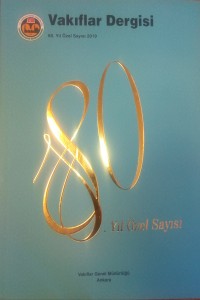Abstract
In spite of the fact that the waqfs have existed with
the history of humankind and are helpful in all social communities, they have a
different and important place in Islamic societies. The waqfs have institutionalized
and organized assistance and solidarity between individuals. Especially in
Islamic societies, a great importance has been attached to waqfs. The waqfs
that helped institutionalize the concept of “infaq” (charitable giving), met
many needs of the community. One of the Islamic states where the waqfs are very
active was the Ottoman Empire. The range of waqf services in the Ottomans
expanded so much that, besides serving individuals and community, waqfs for
injured birds and sick animals were also established. The fact that the waqfs
are so widespread in the state has made it possible to refer the Ottoman Empire
as a waqf civilization.
One of the waqf types operating in the Ottoman Empire
was the cash waqfs (CWs) which hold cash money as capital. The CWs operated its
capital with various Islamic finance methods. Revenues obtained from various
investments were used for the purpose of waqf. The CWs met the vital
necessities of the society pertaining to education and religion in the period
they were active in the Ottoman Empire. Another function of these waqfs was to
operate as a micro-credit mechanism. Through these waqfs, the surplus and the
accumulated savings in the hands of the wealthy people were made available to
merchants, farmers, craftsmen, and artisans. Hence, these waqfs have served as
resource transfer channels as well as functioning as a charity in the society.
The main goal of CWs, which is the
pioneer of modern Islamic financial institutions, is different from that of
Islamic interest-free financial institutions. The CWs did not transfer the
profits they obtained to the waqf’s founder or owner. The income obtained was
spent to fulfill the charitable services. Therefore, these institutions created
an altruistic finance model operating within the borders of Islamic rules and
orders. Therefore, this model has its own principles. In our study, the
financial mentality of the Ottoman society in the context of CWs and how this
mentality shaped them will be discussed. The basic principles of this mentality
and CW model will be emphasized.
Keywords
Cash Waqfs Ottoman Empire Islamic Finance Philanthropy Altruistic Finance Model basic principles of cash waqfs
References
- Akgündüz, Ahmet. (1996). İslâm Hukukunda ve Osmanlı Tatbikatında Vakıf Müessesesi. Osmanlı Araştırmaları Vakfı.
- Berki, Ali Himmet. (1962). “Vakıf Kuran İlk Osmanlı Padişahı”. Vakıflar Dergisi, 5: 127-129.
- Bulut, Mehmet; Korkut, Cem. (2016). “A Comparison Between Ottoman Cash Waqfs (CWs) and Modern Interest-free Financial Institutions”. Vakıflar Dergisi. 46: 23-45.
- Gökbilgin, Mehmed Tayyib. (1952). XV.-XVI. Asırlarda Edirne ve Paşa Livâsı: Vakıflar, Mülkler, Mukataalar. İstanbul: İstanbul Üniversitesi Edebiyat Fakültesi Yayınları, No: 508, Üçler Basımevi.
- Mandaville, Jon E. (1979). “Usurious Piety: The Cash Waqf Controversy in the Ottoman Empire”. International Journal of Middle East Studies. 10(3): 289-308.
- Okur, Kaşif Hamdi. (2005). “Para Vakıfları Bağlamında Osmanlı Hukuk Düzeni ve Ebussuud Efendinin Hukuk Anlayışı Üzerine Bazı Değerlendirmeler”. Hitit Üniversitesi İlahiyat Fakültesi Dergisi, 4(7-8): 33-58.
- Özcan, Tahsin. (1999). “Sofyalı Bâlî Efendi’nin Para Vakıflarıyla İlgili Mektupları”. İslâm Araştırmaları Dergisi, (3): 125-155.
- Özcan, Tahsin (2000). “İbn Kemal’in Para Vakıflarına Dair Risâlesi”. İslâm Araştırmaları Dergisi, Sayı (4): 31-41.
- Pamuk, Şevket (2004). “Institutional change and the longevity of the Ottoman Empire. 1500–1800”. Journal of Interdisciplinary History, 35(2): 225-247.
- Pamuk, Şevket (2012). Osmanlı İmparatorluğu’nda Paranın Tarihi. İstanbul. Tarih Vakfı Yurt Yayınları.
- Sıddıki, Muhammad Nejatullah. (1982). “Recent Works on History of Economic Thought in Islam: A Survey”. International Center for Research in Islamic Economics. Research Series in English No.12. Jeddah: King Abdulaziz University.
- Şimşek, Mehmet (1986). “Osmanlı Cemiyetinde Para Vakıfları Üzerinde Münakaşalar”. Ankara Üniversitesi İlahiyat Fakültesi Dergisi, 27(1): 207-220.
- Uzunçarşılı, İsmail Hakkı (1988). Osmanlı Devleti Teşkilâtından Kapıkulu Ocakları 1. Ankara. Türk Tarih Kurumu Yayınları.
Details
| Primary Language | English |
|---|---|
| Journal Section | Articles |
| Authors | |
| Publication Date | May 30, 2019 |
| Submission Date | December 10, 2018 |
| Acceptance Date | April 25, 2019 |
| Published in Issue | Year 2019 |
Cited By
Ankara’da Bir Haremeyn Toprağı: Balıkhisarı Haremeyn Vakfı
MANAS Sosyal Araştırmalar Dergisi
https://doi.org/10.33206/mjss.1342177
Unruly Mystics and the State: Antinomian Dervishes, Religion, and State Formation in Medieval Anatolia
Studies in Comparative International Development
https://doi.org/10.1007/s12116-025-09476-0
The articles sent to the Journal of Waqfs with a request for publication are subject to preliminary examination by the Editorial Board and at least two academicians who are experts in their fields are sent for review. The copyright of the articles accepted to be published in the Journal of Waqfs with the referee reports and the decision of the Editorial Board is deemed to have been transferred to the General Directorate of Foundations, and a royalty fee is paid to the published articles in accordance with the relevant legislation.

